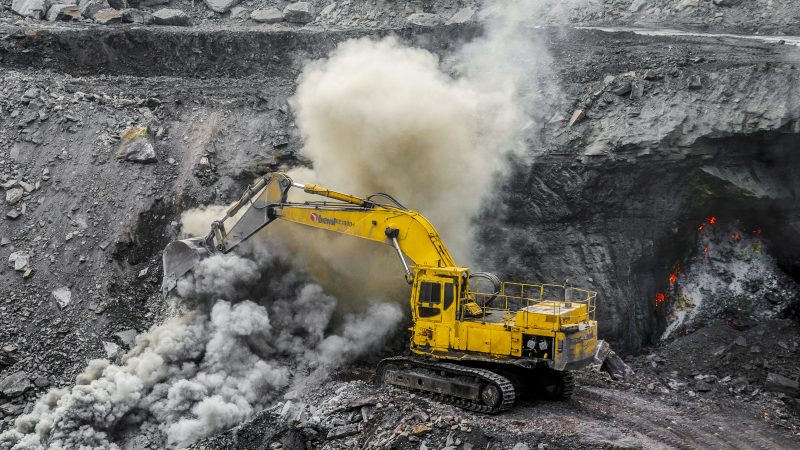Environmental campaigners say it represents the final nail in the coffin of UK opencast coal mining

Newcastle City councillors have thrown out an application for what is thought to be the last prospective opencast coal mine in the UK.
On Friday afternoon, council chiefs unanimously rejected proposals for a new surface mine on the edge of the city, following advice from the local authority’s planning department a number of days beforehand to refuse the plans.
The Dewley Hill mining project would have seen 800,000 tonnes of coal and 400,000 tonnes of fireclay dug up at a greenbelt site just seven miles west of the city – next to the old colliery village of Throckley.
The Banks Group, which brought the application together with Leicestershire brickworks firm, Ibstock, reacted furiously to the decision and said it was considering an appeal.
Having begun to wind up operations at two other sites in Northumberland and County Durham, the company has already seen a major opencast application at Druridge Bay and an extension application for the Bradley surface mine defeated this year.
Describing the outcome as “outrageous”, Banks’ community relations manager, Jeannie Raine, said following the councillors’ decisions: “The committee heard, but did not listen to the indisputable fact that there will be continued demand for industrial coal and fireclay for use in UK steel, cement and brick manufacture, and we remain firm in our belief that these minerals should be mined locally in the UK in the safest, most efficient and most environmentally responsible way possible.”
Environmental campaigners who have been battling Banks’ surface mine applications across the North East have celebrated the decision, which they believe represents the final nail in the coffin of UK opencast coal mining.
Anne Harris, from the Coal Action Network, said: “This is a brilliant result. The Dewley Hill application is the last opencast coal mine application in the UK, the next step is for Banks Group to exit the coal industry.
Environmental campaigners believe it represents the final nail in the coffin of UK opencast coal mining
“Year on year coal contributes less to the National Grid, as cleaner technology supplies electricity and power’s industry. We don’t need opencast coal from this country, nor imported from abroad.”
Local resident and leading member of the grassroots Defend Dewley Hill campaign, Jos Forester-Melville, hailed the decision as “a victory, not only for the Defend Dewley Hill campaign, but for all of us who supported and campaigned constructively for change.”
In a final dig at Banks, and disputing the company’s job creation promises, Throckley resident and campaigner Jude Campbell said the North East firm “claimed it would have created 50 new jobs at Dewley Hill but these are not new jobs for local people, simply continued employment for their existing workforce.
“As a former union rep, the prospect of redundancy for Banks Group employees does not sit easily with me.
“However, Banks Group are promoting an unsustainable business model in a declining industry and it’s grossly irresponsible to promise these workers employment in this industry ad infinitum when coal is on the way out in favour of green technologies.”
Banks argued 250 jobs were at risk as work ground to a halt at its North East sites earlier this year. Ibstock also said this month that refusal of the Dewley Hill plans would be “devastating” for its operations in the area.
Ms Raine continued: “Newcastle City Council identified Dewley Hill as the only minerals site in the city less than six months ago.
“…in the height of the worst economic crisis of our generation, its planning committee has decided to dismiss over 200 existing, well-paid North East jobs and has not grasped the opportunity to support a £75m investment in the regional economy which would secure local supplies of much-needed minerals at the lowest environmental cost.
The focus should now be on developing the clean energy solutions that can power our economy and create the new green jobs of the future
“The committee members also chose to ignore warnings from both Unite the Union and the Heritage Railway Associations that failing to make use of domestic supplies will force UK industry to drag the coal across the globe while simultaneously significantly increasing global greenhouse gas emissions – and all in the name of a simplistic view on climate change.”
Friends of the Earth North East campaigner Simon Bowens both welcomed Friday’s decision and urged Whitehall to follow the precedent set by three different decisions impacting the North East this year – at city council, county council and national government levels.
“This decision will hopefully bring down the curtain on opencast coal mining in England,” he said. “The focus should now be on developing the clean energy solutions that can power our economy and create the new green jobs of the future.
“Coal must be left in the ground if we’re to confront the climate emergency. The government must ‘call in’ Cumbria County Council’s controversial decision to give planning permission to a new mine near Whitehaven.”
Communities Secretary Robert Jenrick indicated earlier this year that he may intervene in light of the council’s approval of what would be the UK’s first deep coal mine in more than three decades.
Campaigners fighting the Woodhouse project told Left Foot Forward, however, that Mr Jenrick as of yet has made no such intervention.
Tommy Greene is a freelance journalist.
To reach hundreds of thousands of new readers we need to grow our donor base substantially.
That's why in 2024, we are seeking to generate 150 additional regular donors to support Left Foot Forward's work.
We still need another 117 people to donate to hit the target. You can help. Donate today.



